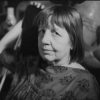Marguerite Young

Marguerite Young
Marguerite Vivian Youngwas an American writer and academic. She is best known for her novel Miss MacIntosh, My Darling. In her later years, she was known for teaching creative writing and as a mentor to young authors. "She was a respected literary figure as well as a cherished Greenwich Village eccentric." Born and raised in Indianapolis, Indiana, Young was educated at Butler University and the Universities of Chicago and Iowa. She briefly taught at Shortridge High School before embarking on...
NationalityAmerican
ProfessionPoet
Date of Birth28 August 1908
CountryUnited States of America
Like Kay Boyle, whose work I'm wild about, I could have married, written a book with every baby, a baby with every book.
I like Gertrude Stein, and spent two weeks with her at the University of Chicago.
I see myself as traditional even though I know you see my work as experimental. I don't really consider Sterne, Joyce, and Proust experimental either because the tradition of their writing goes back a long way. Traditional. The Grand Tradition.
One day I bumped into a group of coal miners from the Ozarks, wandering coal miners living a gypsy life... I started to speak with these coal miners, and became very interested in them.
My first attempt to write about Robert Owen was in the form of poetry. Then I turned it into a blank verse poem, but I discovered that I couldn't fit in all the facts, which are fabulous. I decided to rewrite it a third time, still retaining every image I had already written in the first two versions.
I had read the histories of mountain climbers, of suffragette captains, of travelers to the Middle East... all the ladies who went to the Middle East. I'd like to go myself. I didn't invent anything in my book. I didn't need to.
It's the thing I never could write, the idea of identity and passage of the soul.
I had a book, which was stolen, the art of the life of the character, in which you present a whole life in three of four pages. I used that method.
I think the category between fiction and non-fiction is nothing. The poetry of non-fiction is as fabulous as any poetry you could ever write in fiction. Poets have greatly influenced me. The only difference between the novel as poem and the lyric as poem is the difference in length.
I think that the style is the writing, a beautiful sense of style. And if you don't have it, it doesn't matter what you write, it doesn't really make any difference. I'm not speaking of realistic novels now, but of the pseudo-poetic novel or short story.
I think most people don't like others who, without a voice of their own, emulate the other. I certainly don't want anybody just to pick up my thoughts and hand them back to me.
I was not influenced by Joyce although he's a great writer, and I love his work. I was influenced by Saint Augustine.
Just as I do not want my students to imitate my style, I admire authors who write differently from me. Lewis and Dreiser didn't try to write in a poetic style.
The asexual angel, neither male nor female... unable to live without her mask of illusions... showed herself to be the denuded character every person would be if confronted with the loss of their illusions as she was.